

Canadian site explaining fake news - Are You Newswise? Main site for Newswise. PEW report: News Use Across Social Media Platforms 2016. A majority of U.S. adults – 62% – get news on social media, and 18% do so often, according to a new survey by Pew Research Center, conducted in association with the John S. and James L.
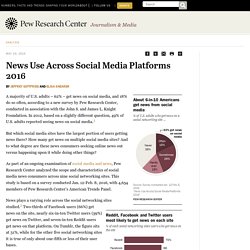
Knight Foundation. In 2012, based on a slightly different question, 49% of U.S. adults reported seeing news on social media. JMAD report: New Zealand media ownership 2016. App: Escape Your Bubble. Article: A spin on the Little Golden Book teaches kids ‘alternative facts’ Article: Children must be trained to fight fake news. Article: Fake News on Social Media. Article: How can you beat the Facebook bubble? Last updated 00:01, March 23 2017 Facebook is working non-stop to give you what it thinks you want.
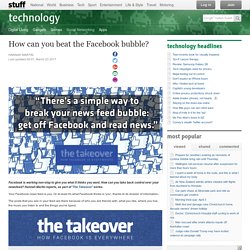
How can you take back control over your newsfeed? Hannah Martin reports, as part of 'The Takeover' series. Your Facebook news feed is you. Or at least it's what Facebook thinks is 'you', thanks to its dossier of information. The posts that you see in your feed are there because of who you are friends with, what you like, where you live, the music you listen to and the things you've typed. Using a device with a slow connection means you might see less video. And clicking 'like'? When you browse the web, Facebook collects information on the pages you visit which have Facebook sharing buttons.
What does Facebook mean to you? Share your stories, photos and videos. The social network has a squad of data scientists, engineers and researchers who work constantly on the personalised stream of content that each of Facebook's two billion users see. The order things appear in your feed isn't random. Article: Is this Auckland's most influential woman? How did an expat South African PR dynamo become one of Auckland’s most influential women?
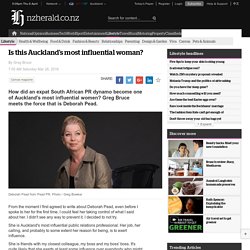
Greg Bruce meets the force that is Deborah Pead. From the moment I first agreed to write about Deborah Pead, even before I spoke to her for the first time, I could feel her taking control of what I said about her. I didn't see any way to prevent it. I decided to not try. She is Auckland's most influential public relations professional.
She is friends with my closest colleague, my boss and my boss' boss. Article: Islamophobia more likely in heavy media consumers - study. New Zealanders who consume more news are more likely to be prejudiced against Muslims, a study has found.
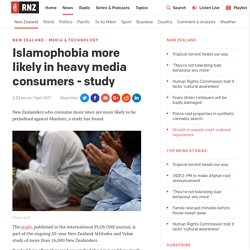
Photo: AFP The study, published in the international PLOS ONE journal, is part of the ongoing 20-year New Zealand Attitudes and Value study of more than 16,000 New Zealanders. It asked how often they read or watched the news and how much warmth and anger they felt towards different groups including Muslims, Arabs and Asians, and found those who followed the news more reported greater anger and less warmth towards Muslims. Federation of Islamic Associations New Zealand president Hazim Arafeh said the report was not a surprise. "We do, as a community, have more acts of harassment when overseas news around violence hits our shores. Article: Lifting the lid a little on PR's pull on journalism. Article: My ‘fake news list’ went viral. But made-up stories are only part of the problem. Fake news spreads easily on Facebook.
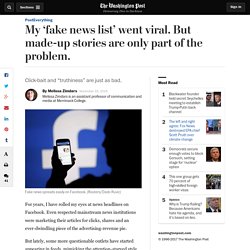
(Reuters/Dado Ruvic) For years, I have rolled my eyes at news headlines on Facebook. Even respected mainstream news institutions were marketing their articles for clicks, shares and an ever-dwindling piece of the advertising-revenue pie. But lately, some more questionable outlets have started appearing in feeds, mimicking the attention-starved style that bothered me when real news organizations used it. These other sources — with names such as 100percentfedup.com and Natural News — started showing up as citations in my students’ papers and referenced as authoritative in classroom discussions, too. So this past Monday morning, I put together a resource for students in my media class, “False, Misleading, Clickbait-y, and/or Satirical ‘News’ Sources.” And by coincidence, fake news was in the real news, too. Article: Trump vs. the media. Boston—Not many months ago I was among the millions of moviegoers transfixed and inspired by the work of a small team of journalists at The Boston Globe – the Spotlight Team – who in 2002 told the shocking story of pedophile priests whose vile acts were routinely protected by the Roman Catholic Church’s hierarchy.
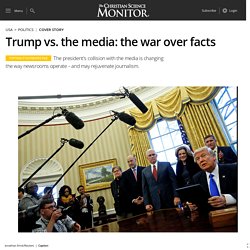
The team’s effort not only won journalism’s highest award, the Pulitzer Prize Gold Medal, but also ignited a global attack on such pedophilia. Theater audiences like mine cheered as the “Spotlight” film credits rolled. I had watched through teary eyes the film’s climactic scene – so familiar to newspaper movies – in which the monstrous presses churn out paper bundles for circulation trucks that fan out across the region delivering the edition containing the story. As a journalist for most of my adult life, my heart swelled with pride. I joined those around me in cheering this demonstration of journalists’ oft-stated mission to comfort the afflicted and afflict the comfortable. Article: We Tracked Down A Fake-News Creator In The Suburbs. Here's What We Learned : All Tech Considered. "The whole idea from the start was to build a site that could kind of infiltrate the echo chambers of the alt-right.
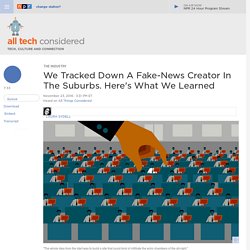
" Fanatic Studio/Getty Images hide caption toggle caption Fanatic Studio/Getty Images "The whole idea from the start was to build a site that could kind of infiltrate the echo chambers of the alt-right. " Article: What does – and doesn’t – make news? Just because you announce something in a news release doesn’t actually make it news.
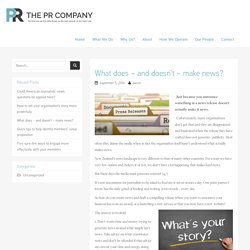
Unfortunately, many organisations don’t get that and they are disappointed and frustrated when the release they have crafted does not generate publicity. Most often they blame the media when in fact the organisation itself hasn’t understood what actually makes news. New Zealand’s news landscape is very different to that of many other countries. For a start we have very few outlets and, believe it or not, we don’t have a lot happening that makes hard news.
But these days the media must generate content 24/7. It’s not uncommon for journalists to be asked to find six or seven stories a day. Article: Why Most Countries Like Partisan Media. Media has always been partisan but when it was only partisan one way, that was the norm.
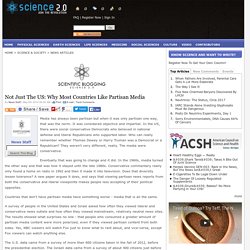
It was considered objective and impartial. In the US, there were social conservative Democrats who believed in national defense and liberal Republicans who supported labor. Who can really remember whether Thomas Dewey or Harry Truman was a Democrat or a Republican? They weren't very different, really. The media were conservative. Blog post: Post-Truth and Fake News.
Earlier in the year I was tasked with creating a resource guide on “post-truth” and fake news.
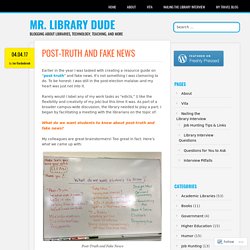
It’s not something I was clamoring to do. To be honest: I was still in the post-election malaise–and my heart was just not into it. Rarely would I label any of my work tasks as “edicts,” (I like the flexibility and creativity of my job) but this time it was. Blog post: Twitter is the New Bus. In November, the Stanford History Education Group (SHEG) released the executive summary of a study they had worked on for the past eighteen months.
I've included the results in a few presentations lately and it keeps reminding me of a lesson I co-taught with a student teacher from my school back in 2012. Here are a few of the slides I use to reference the SHEG study in my presentations. The SHEG instrument included a task that required college students to analyze a Tweet that featured the results of a public opinion survey about gun control. In their analysis of student responses, SHEG said: Definition: Fake news. Hoax or deliberate spread of misinformation Fake news, also known as junk news, pseudo-news, alternative facts or hoax news,[1][2] is a form of news consisting of deliberate disinformation or hoaxes spread via traditional news media (print and broadcast) or online social media.[3][4] Digital news has brought back and increased the usage of fake news, or yellow journalism.[5] The news is then often reverberated as misinformation in social media but occasionally finds its way to the mainstream media as well.[6] Fake news is written and published usually with the intent to mislead in order to damage an agency, entity, or person, and/or gain financially or politically,[7][8][9] often using sensationalist, dishonest, or outright fabricated headlines to increase readership.
Similarly, clickbait stories and headlines earn advertising revenue from this activity.[7] Libguide: Harvard Library research guide. Skip to main content Fake News, Misinformation, and Propaganda This page provides background information, links, and tools from outside organizations to help guide users in navigating potential fake news A Visual Take. Stony Brook Center for News Literacy. News article: Twitter accounts really are echo chambers, study finds. When it comes to politics and the internet, birds of a feather really do flock together, according to research confirming the existence of online echo chambers among the most politically engaged Twitter users.
A study of 2,000 Twitter users who publicly identified as either Labour, Tory, Ukip or SNP supporters has found they are far more likely to interact with others from the same party and to share articles from publications that match their views. Ukip supporters are also far more engaged with “alternative” media outlets, including Breitbart and Infowars, two US-based sites identified with the alt-right that have been regularly accused of publishing misleading or false stories.
The research was carried out by the thinktank Demos, which looked at the tweets sent between May and August last year by 2,000 people who have publicly stated their political allegiance on their profiles and who had at some point addressed a member of parliament in their tweets. Video: The Colbert Report - The Word - Truthiness. Video: How false news can spread. Video: How to choose your news. Video: The Miseducation of Dylann Roof. Video: Nationalism vs. globalism: the new political divide. BBC. Foreign Affairs. The Guardian. Media Take. NPR : National Public Radio. The New York Times. The New Yorker. Newsroom. Politico.
Radio New Zealand. Scoop. The Spinoff. The Wall Street Journal. Washington Post. The Wireless. Investigative journalism from a nonprofit newsroom. International Consortium of Investigative Journalists. New Internationalist. ProPublica. BBC Kids.
Classroom Solutions NZ. KidsClick! Kiwi Kids News. KidzSearch. Time For Kids. All Sides. Fact Check. Politifact. Snopes. Truth or Fiction.